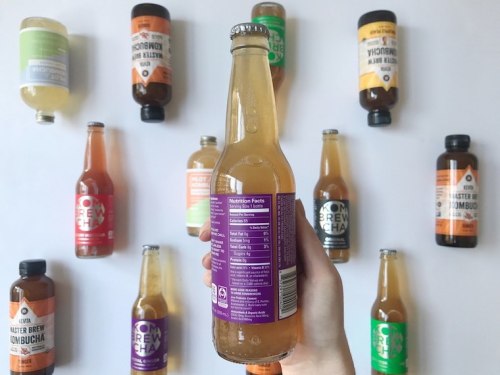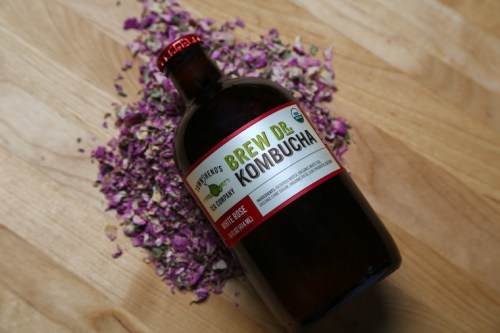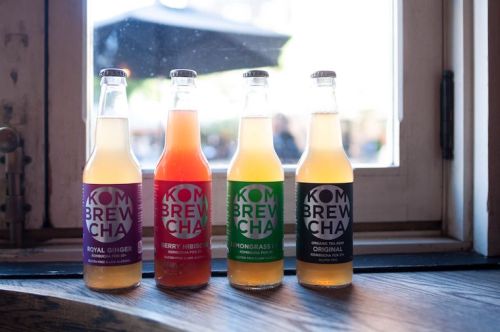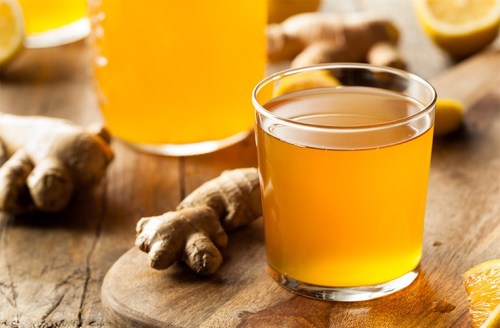When it comes to healthy sips, kombucha is still as trendy as they come—it’s becoming so popular, in fact, that PepsiCo recently acquired KeVita, seeing it as a major money-maker. And this is one food craze that’s not going to torpedo your clean eating goals (looking at you, freakshakes).
It helps that kombucha is one of the easiest ways to get your daily dose of gut-friendly bacteria. “The probiotic content is certainly a component to appreciate,” says Caroline Cederquist, MD, founder of BistroMD. “[Prebiotics] and probiotics consistently demonstrate improvements in digestive health with evidence supporting its use in treating diarrhea and irritable bowel syndrome, and fighting against intestinal infections.”
The bad news? Not all ‘booch is created equal. Some are loaded with sugar (for example, Health-Ade was sued about downplaying the amounts in their products). Others might be pasteurized, which kills the good-for-your-gut mother scoby. And there are even bottles that just aren’t quite what they claim.
So how do you know which bottle to reach for? Fortunately, the label spells everything out—if you know what to look for.
Here, industry experts share their tips on what to look for when you’re choosing a better kombucha.

Make sure it’s certified organic
Kombucha buying rule number one: stick with organic. “The Food and Drug Administration doesn’t approve all kombucha labels, but organic certifiers are super obsessive,” says Matt Thomas, CEO of Brew Dr. Kombucha. To get the organic stamp of approval, for example, he says that Brew Dr. Kombucha has to run every single label change it wants to make by its certifier.
And if companies don’t care enough to go the extra step to get certified organic, he says that they may have lower quality standards overall—and what’s bottled inside could be pasteurized, instead of the (raw) good stuff. “[Pasteurizing] makes it easier to ship and store, but then you’re losing all the probiotic benefits,” he says.
And while buying local is great, Dr. Cederquist recommends reaching for a brand you trust (AKA not something brewed in a neighbor’s home and sold without a label). Otherwise, you don’t know if it’s FDA approved.

The ingredients list should be short and easy to understand
Another tip from Thomas: If there’s anything listed on the bottle that sounds like it was made in a food lab, skip it. Citric acid, phosphoric acid, natural flavors, and sweeteners such as stevia are all unnecessary.
“Kombucha doesn’t require anything other than water, tea, sugar, and the probiotic colony of sugar and yeast,” he says. “So if someone is adding a fortifying probiotic strain, that seems like a brand that is taking a shortcut so they could scale up and mass-produce.”
While kombucha brewing does require some sugar, two to three grams is enough for fermentation. Thomas notes, however, that if you actually want to enjoy the taste of kombucha, a bit more should be added to balance out the vinegar-y tang. “When it comes to sugar, 10 grams per bottle is about as low as you can get while making it taste good,” he says. But anything much more than that should be a red flag. One brand that has found a way to keep sugar content low (as in four grams low) without compromising on taste? Kombrewcha, which uses agave instead of cane sugar.

Check the vitamin listings
Vitamins B is natural byproducts of the kombucha fermentation process, according to Kombrewcha founder Ariel Glazer, so you’ll be able to tell if it’s been brewed correctly according to the nutrition panel.
“If the kombucha doesn’t list [vitamin B], that means it could have been pasteurized with heat, which ruins some of the vitamins,” he says.

Look at the color—and bubbles
While this is something you have to check for with the kombucha itself and not the label, Dr. Cederquist says noting the color is a must. “Kombucha is naturally a light tan color,” she explains. “Be on the lookout if the brew turns from light to a dark black and green color, with mold spots—resembling the mold you would see on bread—and it will also have a foul smell. Regular kombucha smells like a sweet vinegar.”
Glazer adds that carbonation is key. “Bubbles are a sign of a healthy fermentation,” he says. “Flatness is a sign that there just isn’t much going on.”
Another plus: Carbonation makes it taste better, which Glazer says is also crucial. “There is no reason why you have to sacrifice taste just to get something healthy,” he says. “There are plenty of good-quality kombuchas out there that taste delicious!”
Want more good-for-your-gut advice? These gut-health boosting supplements pull double-duty by clearing up your skin. And have you considered spraying probiotics around your home?
Sign Up for Our Daily Newsletter
Get all the latest in wellness, trends, food, fitness, beauty, and more delivered right to your inbox.
Got it, you've been added to our email list.











